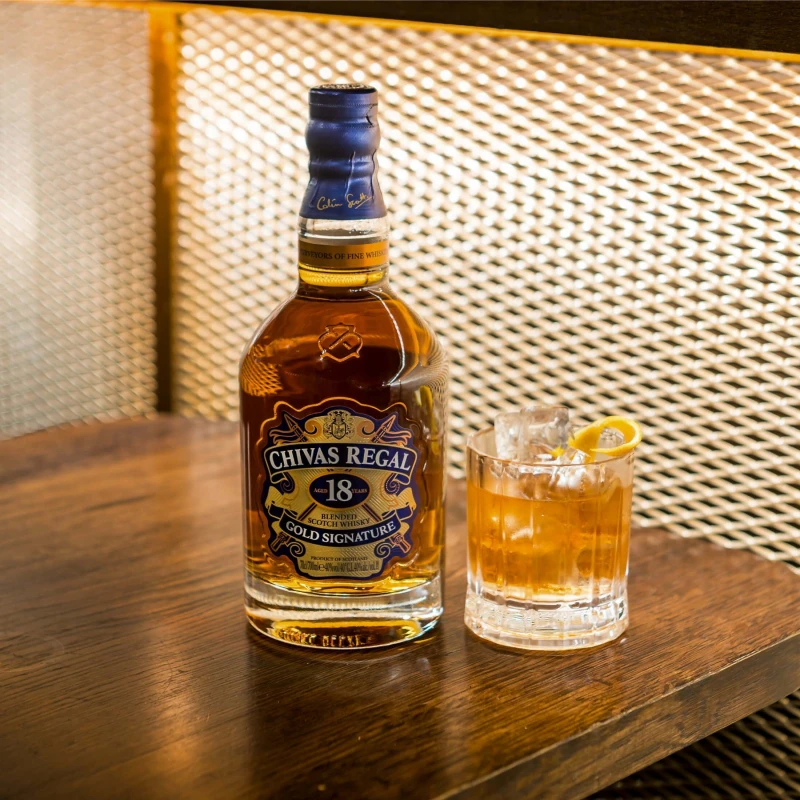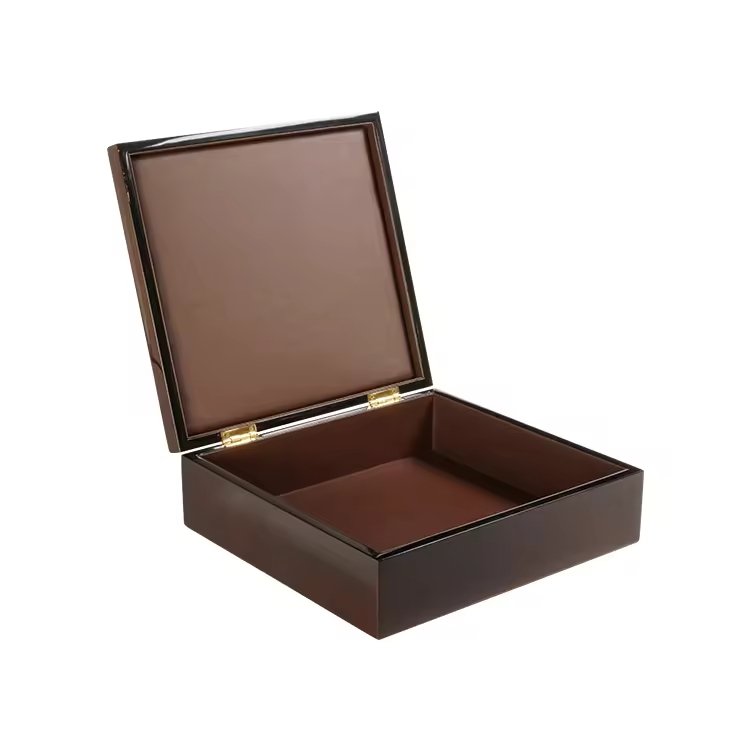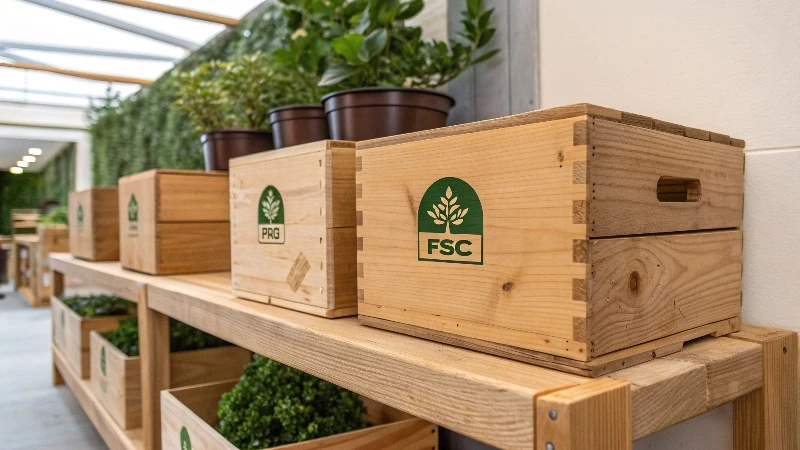
La sostenibilidad es una preocupación cada vez mayor tanto para las empresas como para los consumidores. Como persona que lleva años trabajando en el sector de los embalajes de madera, a menudo me preguntan: ¿Las cajas de madera personalizadas son realmente ecológicas?
Sí, las cajas de madera personalizadas pueden ser ecológicas cuando se obtienen de forma responsable, se fabrican con madera sostenible y se reutilizan de manera eficaz. Su biodegradabilidad, reciclabilidad y menor huella de carbono las convierten en una alternativa más ecológica que el plástico y otros materiales.
Sin embargo, no todas las cajas de madera son igualmente sostenibles. El tipo de madera, las prácticas de abastecimiento y los métodos de producción influyen en su impacto medioambiental global.
¿Por qué las cajas de madera son una opción de embalaje sostenible?
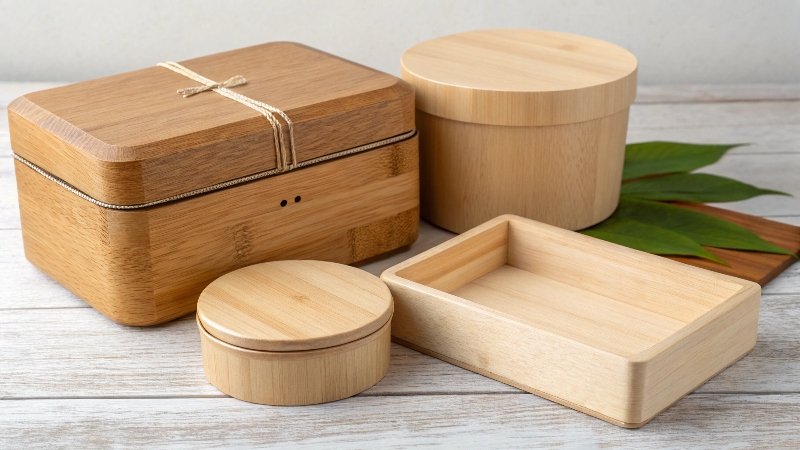
Muchas empresas están optando por los embalajes de madera como alternativa sostenible, pero ¿qué es lo que hace que la madera sea una opción ecológica?
Las cajas de madera son sostenibles porque la madera es un recurso renovable1, biodegradable2, y pueden reutilizarse o reciclarse. Cuando proceden de bosques gestionados de forma responsable, los embalajes de madera minimizan el daño medioambiental.
Ventajas clave de la sostenibilidad de los embalajes de madera
- Renovabilidad – Los árboles se pueden replantar, lo que garantiza un suministro continuo.
- Durabilidad – Las cajas de madera duran más que las alternativas de plástico o cartón.
- Reutilización – Muchas cajas de madera se reutilizan en lugar de desecharse.
- Biodegradabilidad – A diferencia del plástico, la madera se descompone de forma natural.
- Bajo impacto en el procesamiento – En comparación con el plástico o el metal, la madera requiere un procesamiento menos intensivo en energía.
Según mi experiencia, los clientes que priorizan la sostenibilidad suelen preferir Certificado FSC3 cajas de madera, ya que garantizan un abastecimiento responsable y esfuerzos de conservación forestal.
¿Cómo influye el tipo de madera en la huella medioambiental?
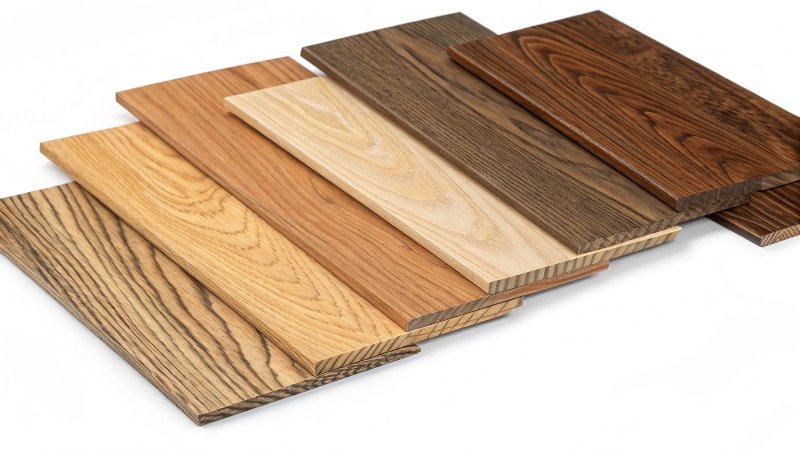
No todas las maderas son iguales en lo que respecta a sostenibilidad4. El tipo de madera utilizada para el embalaje influye directamente en su longevidad y en su impacto medioambiental.
Las maderas blandas, como el pino, crecen más rápido y son más sostenibles, mientras que las maderas duras, como el roble, duran más, pero tardan décadas en madurar. Recuperadas o Madera con certificación FSC5 reduce aún más el impacto medioambiental.
Comparación entre diferentes tipos de madera
| Tipo de madera | Tasa de crecimiento | Durabilidad | Sostenibilidad |
|---|---|---|---|
| Pino | Rápido (10-20 años) | Medio | Altamente sostenible |
| Bambú | Muy rápido (3-5 años) | Medio | Extremadamente sostenible |
| Roble | Lento (más de 50 años) | Alta | Menos sostenible |
| Madera recuperada | No se talarán nuevos árboles. | Varía | El más ecológico |
Siempre que sea posible, recomiendo utilizar madera recuperada6 o especies de rápido crecimiento como el bambú y el pino para minimizar el daño medioambiental.
¿Las cajas de madera personalizadas son biodegradables y reciclables?
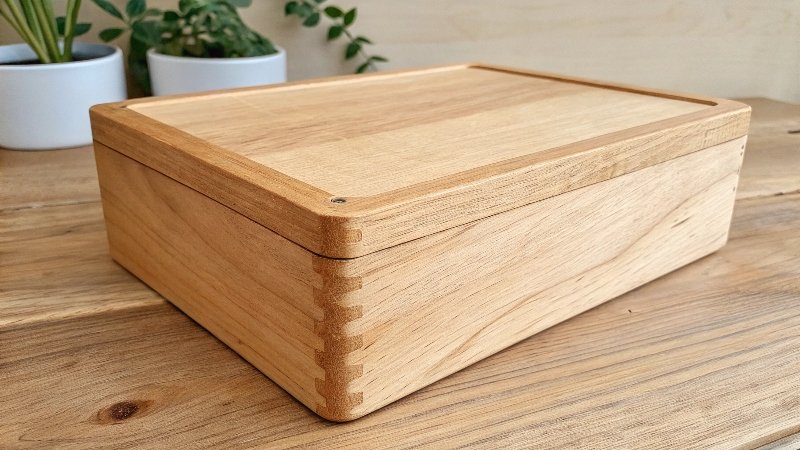
La biodegradabilidad y la reciclabilidad son factores cruciales para determinar si un envase es verdaderamente sostenible.
Sí, las cajas de madera son biodegradable7 y pueden descomponerse de forma natural. También son reciclable8 y reutilizable, lo que reduce los residuos en comparación con los materiales plásticos o compuestos.
Biodegradabilidad frente a reciclabilidad
- Biodegradable: La madera se descompone de forma natural en el suelo, normalmente en unos pocos años.
- Reciclable: La madera se puede reutilizar para muebles, construcción o mantillo.
- Reutilizable: Las cajas de madera de alta calidad suelen reutilizarse en lugar de desecharse.
Dicho esto, siempre aconsejo a los clientes que eviten el exceso. tratamientos químicos, barnices y recubrimientos sintéticos9, ya que estos pueden afectar a la biodegradabilidad y la reciclabilidad.
¿Cómo pueden el abastecimiento responsable y las certificaciones garantizar el respeto al medio ambiente?
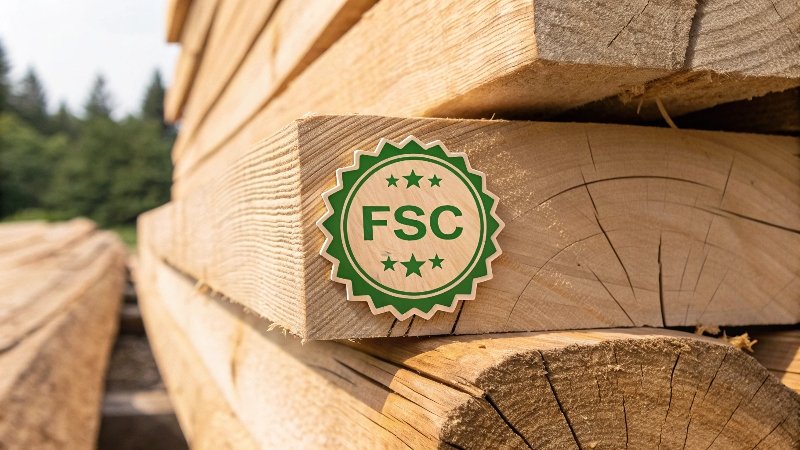
La sostenibilidad no solo consiste en utilizar madera, sino también en donde de dónde proviene. La deforestación y la tala ilegal pueden anular los beneficios medioambientales de los embalajes de madera.
Las certificaciones como FSC y PEFC garantizan que la madera procede de bosques gestionados de manera responsable10, minimizando la deforestación y el daño ecológico. Elegir madera certificada contribuye a los esfuerzos de sostenibilidad.
Principales certificaciones de sostenibilidad
| Certificación | Significado |
|---|---|
| FSC (Consejo de Administración Forestal) | Garantiza prácticas forestales responsables. |
| PEFC (Programa para el Reconocimiento de la Certificación Forestal) | Promueve la gestión forestal sostenible. |
| SFI (Iniciativa Forestal Sostenible) | Apoya la silvicultura responsable en América del Norte. |
Desde mi punto de vista, La madera con certificación FSC es la mejor opción. para empresas que buscan equilibrar la sostenibilidad con envases de alta calidad.
¿Las cajas de madera tienen una huella de carbono menor en comparación con otros materiales de embalaje?
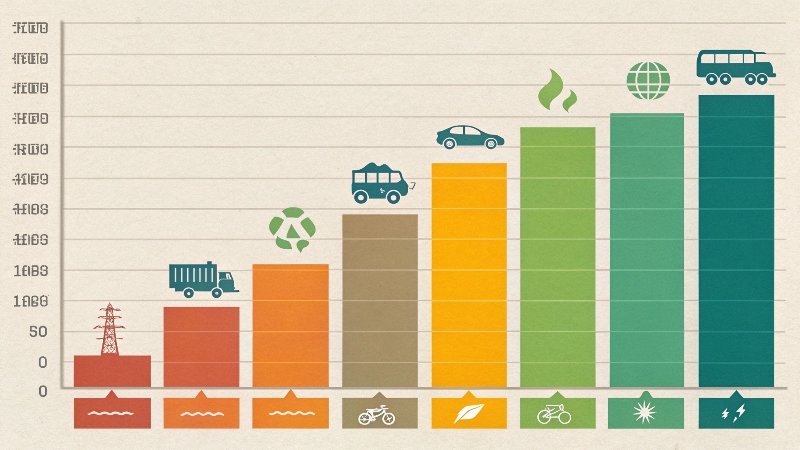
La huella de carbono es uno de los factores más importantes a la hora de determinar si un embalaje es sostenible. ¿Cómo se comparan las cajas de madera con las de plástico, metal o cartón?
Las cajas de madera suelen tener un menor huella de carbono11 que los envases de plástico y metal. Su producción requiere menos energía y Los árboles absorben CO₂.12 durante el crecimiento, compensando las emisiones.
Comparación de la huella de carbono
| Material | Huella de carbono (kg de CO₂ por kg) | Reutilización | Biodegradabilidad |
|---|---|---|---|
| Madera | 0,5 – 1,5 | Alta | Sí |
| Plástico | 6,0 – 10,0 | Bajo | No |
| Metal | 4,0 – 20,0 | Alta | No |
| Cartón | 1,0 – 2,0 | Medio | Sí |
La madera no solo tiene una menor huella de carbono, sino que También captura carbono mientras los árboles crecen.. Sin embargo, el transporte puede afectar a las emisiones, por lo que abastecimiento de madera a nivel local13 es una excelente manera de reducir aún más el impacto medioambiental.
¿Cómo pueden las empresas mejorar la sostenibilidad al utilizar embalajes de madera personalizados?
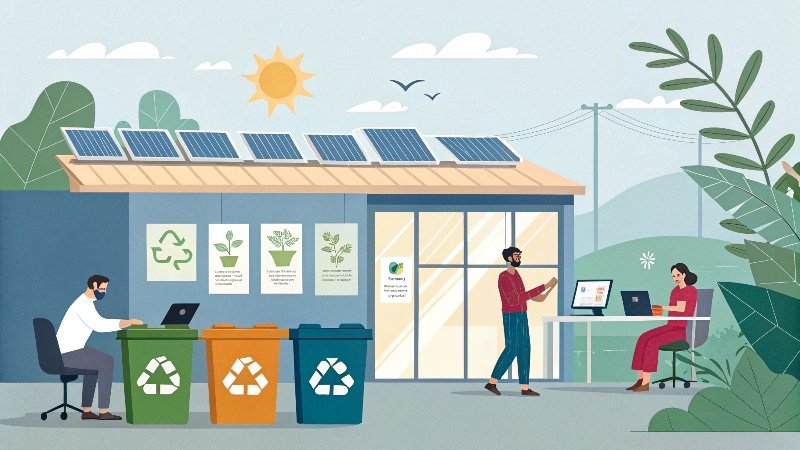
Aunque las cajas de madera son una opción más sostenible, las empresas pueden tomar medidas adicionales para mejorar su respeto por el medio ambiente.
El uso de madera con certificación FSC, la optimización del diseño para reducir los residuos y el fomento de la reutilización pueden mejorar la sostenibilidad de las cajas de madera personalizadas. Los acabados ecológicos y el abastecimiento local también contribuyen a ello.
Mejores prácticas para embalajes de madera sostenibles
- Fuente responsable: Utilice madera certificada o recuperada.
- Optimizar el diseño: Reducir el exceso de material y tamaño.
- Utiliza acabados naturales: Evite los recubrimientos químicos.
- Fomentar la reutilización: Diseñar envases multiuso.
- Apoye la producción local: Minimizar las emisiones del transporte.
Muchos de mis clientes ahora solicitan grabado láser en lugar de logotipos impresos Evitar tintas y recubrimientos que puedan dañar el medio ambiente. Pequeños cambios como estos contribuyen a una solución de embalaje más sostenible.
Conclusión
Las cajas de madera personalizadas pueden ser una solución de embalaje ecológica cuando se obtienen de forma responsable y se utilizan de manera eficiente. Su biodegradabilidad, durabilidad y baja huella de carbono las convierten en una alternativa sostenible al plástico y otros materiales.
Marca: WoodoBox
Eslogan: Cajas de madera personalizadas, hechas a la perfección
Página web: www.woodobox.com
-
Explorar este recurso le permitirá profundizar su comprensión sobre cómo los recursos renovables, como la madera, contribuyen a la sostenibilidad en el ámbito del embalaje. ↩
-
Comprender la importancia de los materiales biodegradables puede ayudarle a apreciar los beneficios medioambientales de elegir embalajes de madera en lugar de plástico. ↩
-
Este enlace proporciona información sobre la importancia de la certificación FSC para garantizar el abastecimiento responsable de materiales de embalaje de madera. ↩
-
Comprender la sostenibilidad en la carpintería puede guiarle a la hora de tomar decisiones ecológicas que beneficien al planeta. ↩
-
Aprender sobre la madera certificada por el FSC proporcionará información sobre las prácticas forestales responsables y su importancia para el medio ambiente. ↩
-
Explorar las ventajas de la madera recuperada puede ayudarte a comprender su papel en la reducción del impacto medioambiental y la promoción de la sostenibilidad. ↩
-
Comprender la biodegradabilidad te ayuda a elegir opciones de embalaje sostenibles que son mejores para el medio ambiente. ↩
-
Aprenda métodos eficaces de reciclaje de madera para minimizar los residuos y promover la sostenibilidad. ↩
-
Descubra cómo los tratamientos químicos afectan a la huella medioambiental y la sostenibilidad de la madera. ↩
-
Descubra cómo los bosques gestionados de forma responsable desempeñan un papel crucial en los esfuerzos de conservación medioambiental y sostenibilidad. ↩
-
Comprender la huella de carbono de los materiales de embalaje ayuda a tomar decisiones respetuosas con el medio ambiente. Explore este enlace para obtener información detallada. ↩
-
Descubra el papel fundamental que desempeñan los árboles en la absorción de carbono y la mitigación del cambio climático. Este conocimiento es crucial para los esfuerzos de sostenibilidad. ↩
-
Descubra cómo el abastecimiento local de madera puede reducir significativamente las emisiones de carbono y apoyar prácticas sostenibles en su comunidad. ↩


